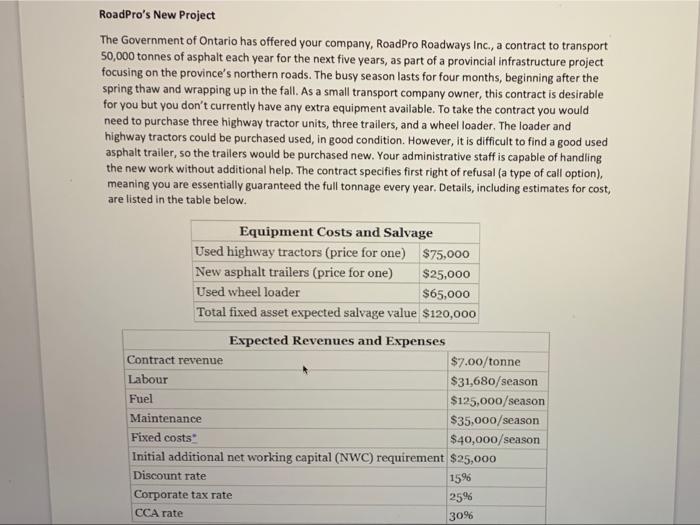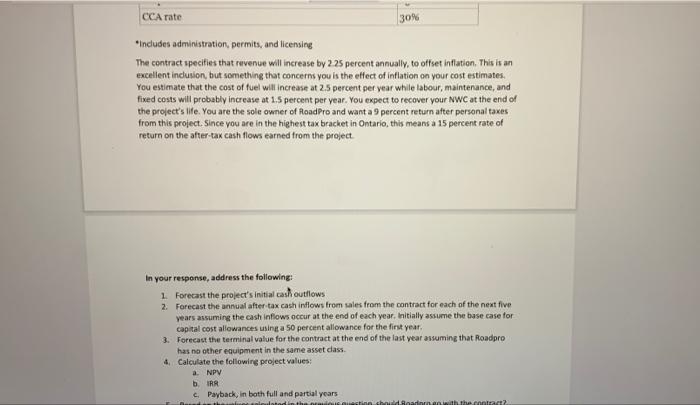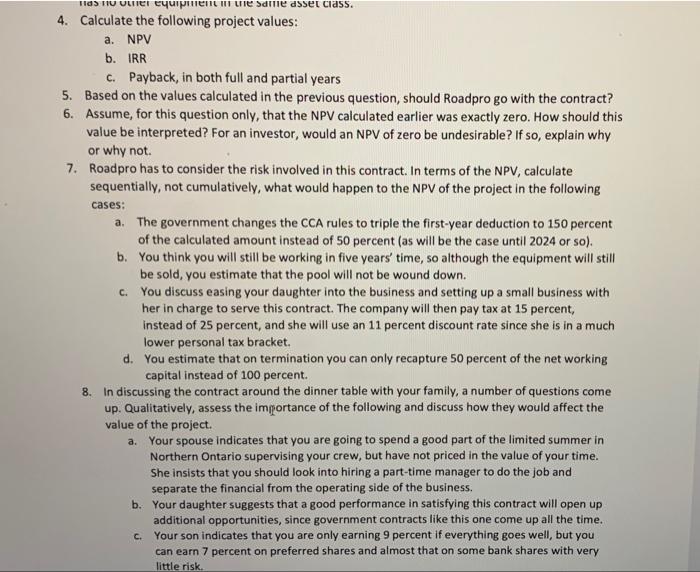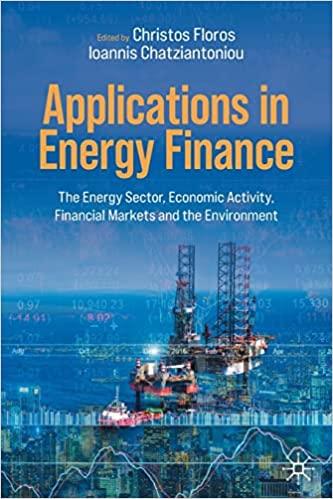RoadPro's New Project The Government of Ontario has offered your company, RoadPro Roadways Inc., a contract to transport 50,000 tonnes of asphalt each year for the next five years, as part of a provincial infrastructure project focusing on the province's northern roads. The busy season lasts for four months, beginning after the spring thaw and wrapping up in the fall. As a small transport company owner, this contract is desirable for you but you don't currently have any extra equipment available. To take the contract you would need to purchase three highway tractor units, three trailers, and a wheel loader. The loader and highway tractors could be purchased used, in good condition. However, it is difficult to find a good used asphalt trailer, so the trailers would be purchased new. Your administrative staff is capable of handling the new work without additional help. The contract specifies first right of refusal (a type of call option), meaning you are essentially guaranteed the full tonnage every year. Details, including estimates for cost, are listed in the table below. Equipment Costs and Salvage Used highway tractors (price for one) New asphalt trailers (price for one) $75,000 $25,000 Used wheel loader $65,000 Total fixed asset expected salvage value $120,000 Expected Revenues and Expenses Contract revenue Labour Fuel Maintenance Fixed costs Initial additional net working capital (NWC) requirement $25,000 Discount rate 15% Corporate tax rate 25% CCA rate 30% $7.00/tonne $31,680/season $125,000/season $35,000/season $40,000/season CCA rate 30% Includes administration, permits, and licensing The contract specifies that revenue will increase by 2.25 percent annually, to offset inflation. This is an excellent inclusion, but something that concerns you is the effect of inflation on your cost estimates. You estimate that the cost of fuel will increase at 2.5 percent per year while labour, maintenance, and fixed costs will probably increase at 1.5 percent per year. You expect to recover your NWC at the end of the project's life. You are the sole owner of RoadPro and want a 9 percent return after personal taxes from this project. Since you are in the highest tax bracket in Ontario, this means a 15 percent rate of return on the after-tax cash flows earned from the project. In your response, address the following: 1. Forecast the project's initial cash outflows 2. Forecast the annual after-tax cash inflows from sales from the contract for each of the next five years assuming the cash inflows occur at the end of each year. Initially assume the base case for capital cost allowances using a 50 percent allowance for the first year. 3. Forecast the terminal value for the contract at the end of the last year assuming that Roadpro has no other equipment in the same asset class. 4. Calculate the following project values: a NPV b. IRR c. Payback, in both full and partial years tod in the orquiqu should Boadoro.so with the contract? has no other equipment in the same asset class. 4. Calculate the following project values: a. NPV b. IRR c. Payback, in both full and partial years 5. Based on the values calculated in the previous question, should Roadpro go with the contract? 6. Assume, for this question only, that the NPV calculated earlier was exactly zero. How should this value be interpreted? For an investor, would an NPV of zero be undesirable? If so, explain why or why not. 7. Roadpro has to consider the risk involved in this contract. In terms of the NPV, calculate sequentially, not cumulatively, what would happen to the NPV of the project in the following cases: a. The government changes the CCA rules to triple the first-year deduction to 150 percent of the calculated amount instead of 50 percent (as will be the case until 2024 or so). You think you will still be working in five years' time, so although the equipment will still be sold, you estimate that the pool will not be wound down. b. c. You discuss easing your daughter into the business and setting up a small business with her in charge to serve this contract. The company will then pay tax at 15 percent, instead of 25 percent, and she will use an 11 percent discount rate since she is in a much lower personal tax bracket. d. You estimate that on termination you can only recapture 50 percent of the net working capital instead of 100 percent. 8. In discussing the contract around the dinner table with your family, a number of questions come up. Qualitatively, assess the importance of the following and discuss how they would affect the value of the project. a. Your spouse indicates that you are going to spend a good part of the limited summer in Northern Ontario supervising your crew, but have not priced in the value of your time. She insists that you should look into hiring a part-time manager to do the job and separate the financial from the operating side of the business. b. Your daughter suggests that a good performance in satisfying this contract will open up additional opportunities, since government contracts like this one come up all the time. C. Your son indicates that you are only earning 9 percent if everything goes well, but you can earn 7 percent on preferred shares and almost that on some bank shares with very little risk









